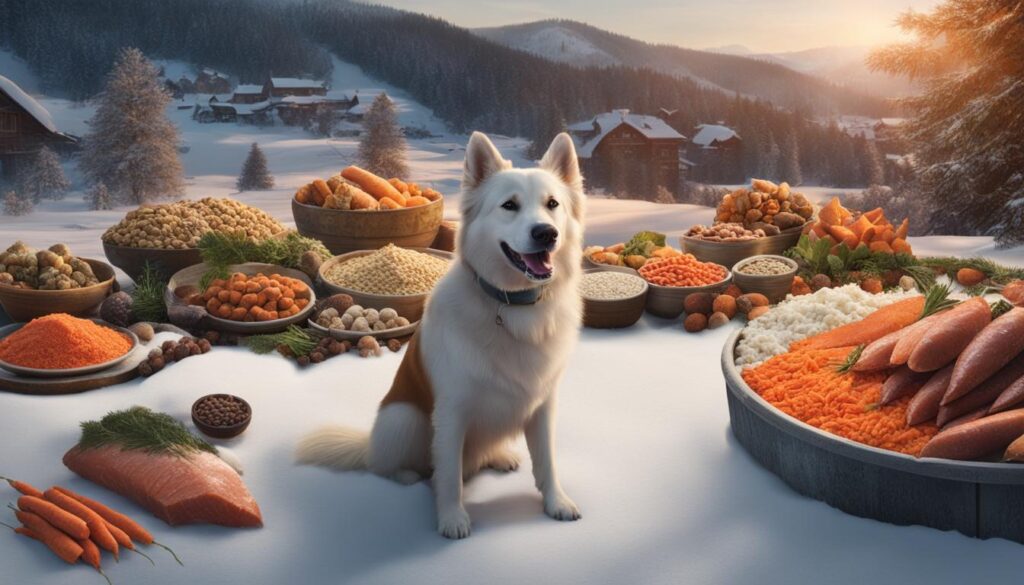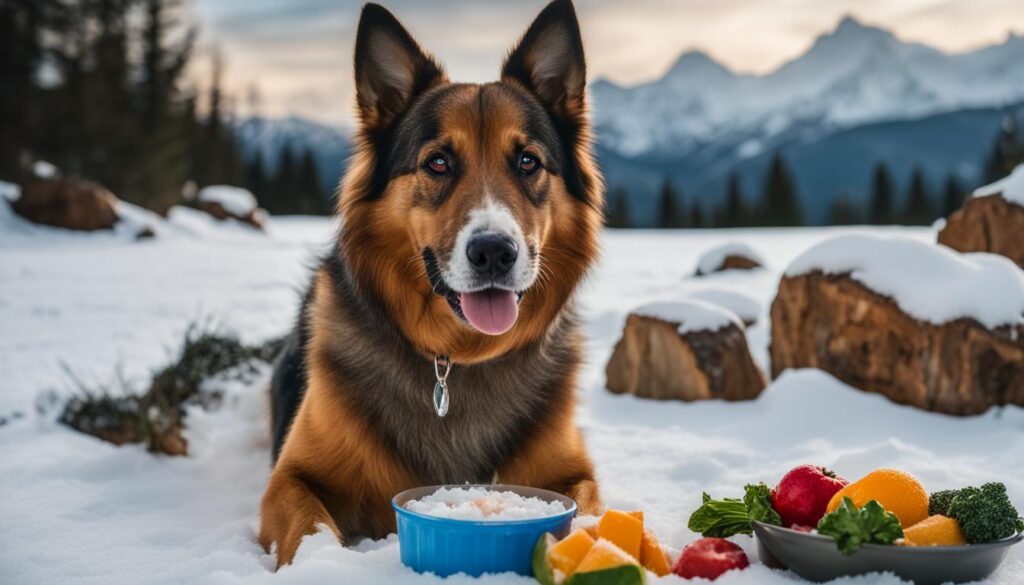Winter can be a challenging time for dogs, especially when it comes to their nutrition. Just like humans, dogs have specific dietary requirements that should be met to keep them healthy during the colder months.
From adjusting their diet to managing caloric intake, there are several ways to optimize your dog’s nutrition in winter. In this section, we will cover everything you need to know about keeping your furry friend healthy and well-fed during the colder months.
Key Takeaways:
- Winter care for dogs includes optimizing their nutrition for improved health and well-being.
- Understanding your dog’s specific nutritional needs in colder months is essential.
- Adjusting your dog’s diet and managing their caloric intake can help keep them healthy.
- Nutritional supplements and high-energy dog food can provide additional support.
- Hydration is important, even in winter.
Understanding Canine Nutritional Needs in Winter
Just like humans, dogs have unique nutritional requirements in colder weather. It’s important to understand these needs to ensure your furry friend stays healthy and happy throughout the winter months.
Cold weather can affect a dog’s metabolism, causing them to burn more calories to stay warm. This means they may require a higher caloric intake during the winter to maintain their weight and energy levels.
In addition to increased calorie needs, dogs may also require different types of nutrients in their diet to support their immune systems and maintain a healthy coat and skin. This is especially important if your dog spends a lot of time outdoors in dry, cold air.
The Importance of a Balanced Diet
The key to meeting your dog’s nutritional needs in winter is a balanced diet. This means providing them with a mix of protein, carbohydrates, and fats in the appropriate proportions for their size and energy requirements.
Consult with your veterinarian to determine the appropriate amount of food your dog should be eating each day, and consider dividing their meals into smaller portions to help them digest the food more easily.
Choosing the Right Nutrients for Your Dog’s Winter Diet
When it comes to choosing the right nutrients for your dog’s winter diet, there are a few key considerations to keep in mind. These include:
- Protein: Dogs require high-quality protein to support their muscles and overall health. Look for protein sources such as chicken, turkey, beef, and fish in your dog’s food.
- Fats: A certain amount of fat is essential for your dog’s health and energy levels. Look for healthy fats such as fish oil, flaxseed oil, and chicken fat in your dog’s food.
- Carbohydrates: While dogs don’t require as many carbohydrates as humans, they still need a certain amount for energy. Look for high-quality carbohydrates such as sweet potatoes, peas, and brown rice in your dog’s food.
- Vitamins and Minerals: Dogs require a range of essential vitamins and minerals to maintain their health and well-being. Look for foods that are fortified with these nutrients, or consider supplementing your dog’s diet if necessary.
Supplementing Your Dog’s Diet in Winter
In addition to a balanced diet, you may also want to consider supplementing your dog’s diet with additional nutrients to support their health during the winter. Some common supplements for dogs in winter include:
- Fish oil: Rich in omega-3 fatty acids, fish oil can help support your dog’s skin and coat health, as well as boost their immune system.
- Probiotics: Probiotics can help promote digestive health in dogs, which is especially important during the winter months when dogs may be more prone to digestive issues.
- Glucosamine: If your dog suffers from joint pain or stiffness, glucosamine supplements can help support joint health and mobility.
Adjusting Your Dog’s Diet for Winter
To ensure your dog stays healthy and happy throughout the colder months, it’s important to make adjustments to their diet. Here are some winter dog food recommendations to keep your furry friend healthy:
Consider Their Energy Needs
During the winter months, dogs require more energy to maintain their body temperature. If your dog is more active or spends more time outside during winter, they may require an increase in caloric intake. On the other hand, if they are less active, it may be necessary to reduce their caloric intake to avoid weight gain. Consult with your veterinarian to determine the right level of caloric intake for your dog.
Choose the Right Type of Food
| Food Type | Advantages | Disadvantages |
|---|---|---|
| Dry Food | Convenient, longer shelf-life | May contain more fillers, less moisture |
| Wet Food | High moisture content, more palatable | Shorter shelf-life, more expensive |
| Semi-Moist Food | Easy to store, convenient | Contains more preservatives, less moisture |
When choosing a food type, consider your dog’s preferences, nutritional needs, and any health concerns they may have. It’s essential to read the labels to ensure the food provides a balanced diet for your dog.
Incorporate Nutritious Ingredients
Winter is an excellent time to include warm and nutritious ingredients in your dog’s diet, such as cooked vegetables, lean proteins, and healthy fats. These ingredients can help keep your dog healthy and improve their immune system. Avoid feeding your dog unhealthy table scraps, as they can cause digestive issues and weight gain.
Offer Fresh Water
Hydration is essential for your dog, even in the colder months. Make sure your dog has access to fresh, clean water at all times. Consider using a heated water bowl to prevent the water from freezing.
Essential Nutrients for Canine Winter Health
As the temperature drops, dogs require specific essential nutrients in their diet to maintain optimal health throughout the winter. The following nutrients are crucial for canine winter health:
| Nutrient | Function | Food Sources |
|---|---|---|
| Protein | Builds and repairs tissues | Chicken, beef, fish, eggs |
| Fats | Provides energy and insulation | Fish oil, chicken fat, flaxseed |
| Carbohydrates | Provides energy | Sweet potatoes, brown rice, oats |
| Vitamins | Essential for body functions | Fruits, vegetables, organ meat |
| Minerals | Essential for body functions | Beef, chicken, fish, eggs |
These nutrients are necessary for maintaining your dog’s physical health, promoting strong immune function, and keeping their coat healthy and shiny.
In addition to these essential nutrients, it’s important to make dietary adjustments for your dog during the winter months. These adjustments may include increasing their calorie intake, switching to a higher energy dog food, or supplementing their diet with additional vitamins or minerals. Consult with your veterinarian for personalized recommendations based on your dog’s individual needs.
To ensure your dog gets the essential nutrients they need during the winter, consider incorporating the following foods into their diet:
- Lean proteins such as chicken, turkey, and fish
- Fatty acids such as fish oil or flaxseed
- Complex carbohydrates such as sweet potatoes or brown rice
- Fruits and vegetables such as carrots, apples, and leafy greens
By providing your dog with a balanced diet rich in these essential nutrients, you can help them stay healthy and happy throughout the colder months.


Managing Caloric Intake in Winter
During the winter, it’s important to find the right balance for your dog’s caloric intake. While some dogs may require increased energy to stay warm, others may be more prone to weight gain due to decreased activity levels. Here are some tips for balancing your dog’s calorie intake in winter:
- Consult with your veterinarian to determine your dog’s individual needs and ideal weight.
- Adjust their feeding schedule to match their activity levels. Dogs who exercise less may need smaller, more frequent meals to avoid overeating.
- Consider incorporating high-fiber foods into their diet to help them feel fuller for longer periods of time.
- Monitor your dog’s weight regularly and make adjustments to their diet as needed.
If your dog requires extra calories to stay warm during the winter, consider choosing a high-energy dog food. It’s important to note, however, that not all dogs will need this type of food. Your veterinarian can help you determine if a high-energy diet is appropriate for your dog.
Remember, it’s essential to balance your dog’s caloric intake during the winter to keep them healthy and avoid weight-related health issues. By following these tips and monitoring your dog’s weight regularly, you can keep them happy, healthy, and energized throughout the colder months.


Supplementing Your Dog’s Diet in Winter
In addition to a balanced diet, nutritional supplements can provide added support to your dog’s health during the winter months. Some supplements may help boost their immune system, improve joint health, and provide extra energy. When choosing a supplement, it’s important to consult with your veterinarian to ensure it’s safe and beneficial for your dog’s needs.
Common Nutritional Supplements for Dogs in Winter
There are a variety of supplements that may benefit your dog during the colder months:
| Supplement | Benefits |
|---|---|
| Fish oil | May help improve joint health and reduce inflammation. It may also promote a healthy coat and skin. |
| Probiotics | May aid in digestion and boost the immune system, helping to fight off illness. |
| Multivitamins | May help fill nutritional gaps in your dog’s diet and support their overall health. |
| Glucosamine/chondroitin | May help support joint health and reduce inflammation, making it beneficial for older dogs or those with joint issues. |
It’s important to note that supplements should not be used as a replacement for a balanced diet. Instead, they should be used to complement your dog’s diet and provide additional support.
How to Incorporate Supplements into Your Dog’s Diet
When adding supplements to your dog’s diet, it’s important to follow the instructions carefully. Dosages may vary based on your dog’s size and specific needs.
Some supplements may come in the form of pills, while others may be added directly to their food. You can also find treats that contain added supplements for added convenience.
Remember to always consult with your veterinarian before starting your dog on any new supplement regimen.


Choosing High-Energy Dog Food for Winter
If your dog has a higher energy level, it may require an adjusted diet during the colder months. High-energy dog food is designed to provide the necessary caloric intake to support your dog’s activity levels, metabolism, and overall health. In this section, we will explore the benefits of high-energy dog food, discuss the winter dog food requirements, and provide guidance on selecting the right type of food to meet your dog’s needs.
The Benefits of High-Energy Dog Food
High-energy dog food typically contains increased levels of protein, fat, and carbohydrates that can help meet the higher energy demands of active dogs. This type of food can provide the fuel your dog needs to stay warm and energized during outdoor activities, such as winter hiking or playing in the snow.


Winter Dog Food Requirements
When choosing high-energy dog food for winter, consider your dog’s specific needs, such as its age, breed, activity level, and weight. You should also look for food that contains healthy sources of fat, such as chicken or fish oils, to provide essential fatty acids that help support your dog’s skin and coat health. Finally, make sure to choose food that is easy to digest to avoid digestive problems and promote overall well-being.
Selecting the Right Type of Food
There are various types of high-energy dog food available, including dry and wet options, as well as raw food. Dry food is a convenient and cost-effective option, while wet food can provide added moisture and nutrients. Raw food diets can also be a good option, but require more preparation and caution to avoid potential health risks. Consult with your veterinarian to determine the best type of food for your dog’s specific needs and preferences.
Keeping Your Dog Hydrated in Winter
Ensuring your dog stays properly hydrated during the winter is essential for their health and well-being. Even though they may not feel as thirsty as they do during the summer, it’s important to encourage them to drink fluids regularly.
One way to keep your dog hydrated is to monitor their water intake and make sure they have access to fresh, clean water at all times. Consider placing multiple water bowls throughout your home, as well as outside, so they’re never without water when they need it.
In addition to water, you can also include moist foods in their diet to increase their overall fluid intake. This can include wet dog food or adding water to their dry food.
If your dog spends a lot of time outdoors in the cold, you may need to adjust their water intake to prevent it from freezing. Consider using heated water bowls or refreshing their water frequently to prevent it from turning into ice.


Remember, dehydration can lead to serious health problems for your dog, including kidney issues and urinary tract infections. By taking simple steps to ensure they stay hydrated, you can help maintain their overall health and well-being throughout the winter.
Conclusion
Optimizing your dog’s nutrition during the winter is crucial for their health and well-being. By understanding their specific dietary needs, making appropriate adjustments, and considering supplemental support, you can ensure your furry friend stays healthy, energetic, and warm throughout the cold season.
Remember to consult with your veterinarian for personalized advice based on your dog’s individual needs. Your vet can help you create a tailored winter diet plan for your dog and recommend the best nutritional supplements to support their health.
Don’t forget to keep your dog hydrated during the winter months. By providing fresh, clean water and monitoring their water intake, you can help prevent dehydration and ensure your dog stays healthy and happy throughout the season.
Thank you for reading our guide on optimizing your dog’s nutrition for winter. We hope you found the information helpful and informative. Stay warm and keep your pup healthy!
FAQ
What are the specific nutritional needs of dogs during the winter?
Dogs have unique nutritional requirements in colder months. They may need more calories to maintain their body temperature and energy levels. Additionally, their diet should include a balance of proteins, fats, and carbohydrates to support their overall health during the winter.
How can I optimize my dog’s nutrition for the winter?
To optimize your dog’s nutrition during the winter, you can consider adjusting their diet to include more high-quality proteins and healthy fats. Adding foods with omega-3 fatty acids and antioxidants can help support their immune system. It’s also important to monitor their calorie intake and ensure they stay hydrated.
What types of food should I choose for my dog’s winter diet?
When choosing food for your dog’s winter diet, look for options that are nutritionally balanced and appropriate for their life stage. Consider foods that are specifically formulated for cold weather or contain ingredients such as fish oil or flaxseed for added omega-3 fatty acids. It’s also a good idea to consult your veterinarian for personalized recommendations.
Are there any essential nutrients that my dog needs during the winter?
Yes, there are several essential nutrients that play a crucial role in your dog’s winter health. These include proteins for muscle maintenance, fats for energy and insulation, and vitamins and minerals for overall well-being. It’s important to provide a balanced diet that includes these nutrients in appropriate amounts.
How can I manage my dog’s calorie intake in winter?
Managing your dog’s calorie intake during the winter is essential to prevent weight gain or loss. You can monitor their weight and body condition to determine if adjustments are needed. Consider consulting with your veterinarian to calculate the appropriate number of calories for your dog based on their size, activity level, and specific needs.
Should I consider supplementing my dog’s diet during the winter?
Supplementing your dog’s diet with nutritional supplements can provide additional support during the winter. Omega-3 fatty acids, glucosamine, and vitamin E are commonly used supplements for joint health and immune system support. However, it’s important to consult with your veterinarian before adding any supplements to your dog’s diet.
Is high-energy dog food beneficial for winter?
Some dogs, especially those with higher energy needs, may benefit from high-energy dog food during the winter. These foods are formulated with increased calorie content and can help provide the extra energy required to stay warm and active in cold weather. However, it’s crucial to consult with your veterinarian to determine if this type of food is appropriate for your dog.
How can I ensure my dog stays hydrated in winter?
Keeping your dog hydrated is important even in winter. Make sure they have access to fresh water at all times. If your dog prefers warmer water, you can use heated bowls or offer lukewarm water. Consider providing wet food or adding water to dry food to increase their overall fluid intake. If you notice any signs of dehydration, contact your veterinarian.

